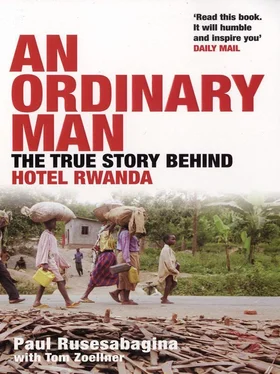He never quite recovered. Though he had the skills and the ambition to become an engineer, the only job he could get was selling banana beer in a stand by the side of the road. He later moved to Kigali, where he landed a clerical job in a bank. But he was always plagued by the image of what he might have become had he been allowed to continue his education and use all of the formidable talents that had rotted inside of him. When we were both much older I tried to get together with him for beers from time to time, but there was a taint of sadness, and even anger, that always hung over our friendship. I was one thing in the blood and he was another and there was nothing either of us could do to change it. He was a Tutsi by accident and he had to live the rest of his life under that taint, occasionally in fear for his life from the public safety committees and destined to work in dead-end jobs. It was an appalling waste-not just of a man but of a potential asset to Rwanda and the rest of the world. Gerard had something to give. It was not wanted.
As one born into the favored class, my accidental path would be different.
I SUPPOSE THAT every capital city in Africa -even those of the poorest countries-must have a place like the Hotel Mille Collines near its heart.
All the impoverished nations on earth, in fact, have these few basic things: a flag, an army, borders, something resembling a government, and at least one luxury hotel where the rich foreign visitors and aid workers can stay. When operatives from the Red Cross in Geneva or researchers from Amnesty International in London come here on their missions, they don’t stay in local guesthouses. They stay where they are treated to high standards of comfort-even though they’ve come to work on uncomfortable problems like AIDS, deforestation, torture, and starvation. So there is always a demand for a spot of opulence in a nation of mud houses. It is not all bad. A few hundred locals get decent jobs as chambermaids, waiters, and receptionists. Some elite suppliers get food and beverage contracts. Most of the profits, however, are shuttled back to whatever multinational company owns the property. The cost for a room is usually equal to the yearly income of an average person in that country. I am not saying this is right. But this is the reality of modern Africa. And so in every impoverished nation on the continent, from Burkina Faso to the Central African Republic, you can inevitably find that one hotel a short walk away from the embassies where fresh laundry and gin and tonics are taken for granted and where there is an aura around the place that prevents any peasant from ever thinking of going inside.
In Rwanda, that place is the Hotel Mille Collines.
It is a modernist building of five stories, with a facade of stucco and smoked glass. From the outside it would look perfectly at home near any large American airport.
The Mille Collines was built in 1973 by the Sabena Corporation, which was the national airline of Belgium until it went bankrupt a few years ago. It was founded as the Société Anonyme Belge d’Exploitation de la Navigation Aérienne, a mouthful of a brand name later shortened to the acronym Sabena. It started off flying short cargo runs between Boma and Léopoldville and branched into passenger service. The executives foresaw the demand for an island of stateless luxury in the dirt streets of Kigali, and so they built the Hotel Mille Collines, aimed primarily at the diplomatic and humanitarian trade but with an eye toward snaring the occasional adventurous tourist on his way to see the gorillas in the north.
There is only one way in or out of the Hotel Mille Collines: a two-lane driveway leading to and from the gate inside and the paved street outside. You could walk, it is true, but almost anyone who stays there would be driven in. The gate leads into a parking lot landscaped with colorful African plants and shrubs and surrounded from the outside world with a fence of bamboo poles. A line of flagpoles flies the national banners of Rwanda and Belgium and the corporate flag of the airline. There is a turnabout for cars to deposit their passengers at the lobby. You can feel the crisp blast of the air conditioner a few feet in front of the door. The lobby is tiled with sand-colored flagstones and decorated with potted plants and wicker couches. The staff behind the reception desk has been trained to greet all visitors cordially in French and English. There are a few shops that sell all the things a tourist might want: suntan lotion, aspirin, a carved figurine or a colorful African-print shirt as a gift. The indirect pinkish light filtering in through the big windows to the north and the tasteful fruit colors in the lobby give the place a tropical feeling. I have been told the entrance of the Mille Collines resembles that of beach vacation resorts in Fiji or Mexico. Off to one side is a small suite of offices for the general manager, the assistant general manager, and an agent of the airline.
Upstairs are 112 guest rooms, each one furnished according to the standards of upscale Western lodging. There are televisions with hundreds of satellite channels in multiple languages, beds with firm mattresses, shaving kits wrapped in protective plastic, circular cakes of soap. There are bedside phones guaranteed to give you a dial tone, a shower with safe water, a small strongbox with an electronic combination for your passport and money. The rooms smell like lavender cleaning solution. Those facing the pool are more expensive and have balconies shaped like half diamonds, where you can step out for a view of Kigali. Those facing the parking lot have false balconies so the sides don’t look flat when viewed from the outside.
On the top floor is a small cocktail bar and also a set of conference rooms for visiting corporations or aid groups to hold their presentations. There used to be an unwritten rule in the elite circles that if your meeting wasn’t held at the Mille Collines it wouldn’t be taken seriously.
Down the hall from the bar and the conference rooms is the Panorama Restaurant. Here you can get escargots or chateaubriand or crab soup of a quality-and at prices-that match what you’d find in Brussels, Paris, or New York. Every morning there is an extensive breakfast buffet with good strong Rwandan coffee and five kinds of juices and a staff of waiters lurking discreetly in the background, watching for an empty cup or a dropped fork. If you’re dining as a couple two servers will deliver the food to your table all at once so you will be disturbed for as brief a time as possible. The restaurant has no north wall-it opens up to a striking al fresco view of the Nyabugogo valley. You can see houses clinging to the far hillsides and the Boulevard of the Organization of African Unity, which runs to the north side of town and the airport. On the farthest hill in the distance is the black doughnut of the national soccer stadium, with banks of lights rising on poles from its outer walls.
The air in Kigali is sometimes hazy from farm dust and heavy with truck exhaust, but the view is always gorgeous and the sun never hits the dining tables directly. The Belgian architects saw to that by orienting the restaurant on a diagonal of the compass, away from both the sunrise and sunset. And when it rains, they simply close the blinds.
The most important place in the Hotel Mille Collines is on the lowest level. This is the rear courtyard, where there is a tidy lawn, a huge fig tree, and a small swimming pool without a diving board. There is also an open-air bar with about twenty tables and a few ceiling fans to push the air around. Ten more tables-the best ones-are set up in an L pattern around the pool.
Around this small square of water is where the real business of the Mille Collines is conducted. What takes place here far surpasses the day-to-day management worries of the hotel. Some people have even called it the shadow capital of Rwanda. You can probably guess why. It is the spot where the local power brokers come to share beer and ham sandwiches with aid donors, arms dealers, World Bank staffers, and various other foreigners who have some kind of stake in our country’s future.
Читать дальше











![Paul Finch - A Wanted Man [A PC Heckenburg Short Story]](/books/702381/paul-finch-a-wanted-man-a-pc-heckenburg-short-sto-thumb.webp)
